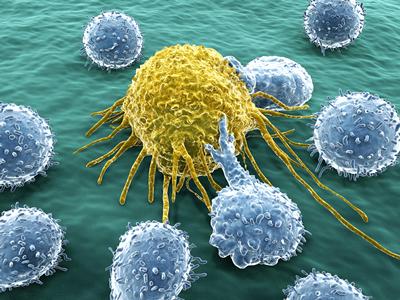New cancer research centre receives major boost

The University of Southampton’s campaign to build a new centre dedicated to cancer immunology research has moved a big step forward thanks to a major gift.
The £1.35 million donation from alumnus James Vernon and his wife Mindy, means the University has entered the final phase of the campaign to raise the target of £25 million. The total now reaches £20.5 million.
The Centre for Cancer Immunology is the first of its kind in the UK and is expected to open in September. It will bring world leading cancer scientists under one roof and enable interdisciplinary teams to expand clinical trials and develop lifesaving drugs.
For decades Southampton scientists have made a number of advances in tumour immunology and immunotherapy research with a reputation for its ‘bench to bedside’ results.
Immunotherapy is a revolutionary treatment, supercharging the body’s natural defences to find and destroy cancer. The new treatments being developed by Southampton scientists, in the form of vaccines and antibodies, direct special immune cells against cancers. These ‘killer’ cells can control and shrink cancer and give long-lasting protection. The University is developing treatments to target some of the most aggressive forms of the disease including cancers of the lung and skin, and childhood neuroblastoma.
The generous donation will support the Southampton Clinical Trials Unit (SCTU) in the Centre. The SCTU allows the scientific discovery from Southampton’s laboratories (the bench) to be developed into clinical trials where patients within the NHS (the bedside) are able to enter the trial and the new treatments are evaluated. If these clinical trials show benefit then the hope is that drugs will be approved for all future patients to receive on the NHS.

“Cancer is a devastating disease affecting so many people, but immunotherapy is one of the most exciting new forms of cancer treatment,” James said. “Mindy and I have been impressed with the University of Southampton’s successful and crucial role in the expansion of this field of scientific research over the past 40 years and the inspirational scientists and clinicians who are making a difference to patients. The new Centre will enable them to continue to fight cancer on an even bigger scale. We also hope that our philanthropy will motivate other people to give to this campaign. As I am a graduate of the University, we are especially proud to support the Southampton Clinical Trials Unit, which will be where Southampton’s ground breaking research impacts directly on patients’ lives.”
Professor Tim Elliott, Director of the Centre for Cancer Immunology, said: “We are delighted and very grateful to receive such a generous donation from Mr and Mrs Vernon, especially so close to World Cancer Day. Our new Centre will allow us to build on our expertise to make even greater progress in developing new treatments. The University has made major advances in tumour immunology and immunotherapy research and we strongly believe the new Centre will go a long way in helping many more people with cancer become free of the disease.”
Professor Sir Christopher Snowden, Vice-Chancellor of the University of Southampton, adds: “We’d like to extend our heartfelt gratitude to Mr and Mrs Vernon for his significant donation. The next few years will see great advances in immunotherapies for cancer with the University of Southampton at the very forefront of discovery.”
One person who has benefited from a Southampton clinical trial is Charlotte Moss. Charlotte was diagnosed with malignant melanoma in January 2011 but after surgery and further tests she was told that the cancer had spread and chemotherapy and radiotherapy would not be effective treatment options. She was invited to take part in a trial to test an immunotherapy drug called ipilimumab.
Unbeknown to her, Charlotte was luckily assigned to the experimental arm of the large randomised, double blind, phase III trial which meant she received the immunotherapeutic drug and not a placebo. Overall, the trial, which was published in the New England Journal of Medicine, showed that patients who received ipilumumab had a higher rate of recurrence-free survival. This was the case for Charlotte, who last year was confirmed cancer-free five years after her immunotherapy.
Charlotte said: “When I returned to hospital for tests after my final surgery they peeled back the covering of the affected lymph-node, and to my dismay, found it was cancer. It started to dawn on me just how serious this was. It was terrifying. I don’t think I would be here if it wasn’t for the drug and the trial that I was on at Southampton. I feel very lucky.”
In the run up to World Cancer Day on Saturday 4 February, the University is inviting people to honour a loved one affected by cancer by #WearingWhite and donating £3 to the Centre for Cancer Immunology. People can donate by texting YOUREIT to 70660 to donate £3. Full details on how to get involved can be found at https://www.southampton.ac.uk/youreit/wearingwhite
Links to external websites
The University cannot accept responsibility for external websites.